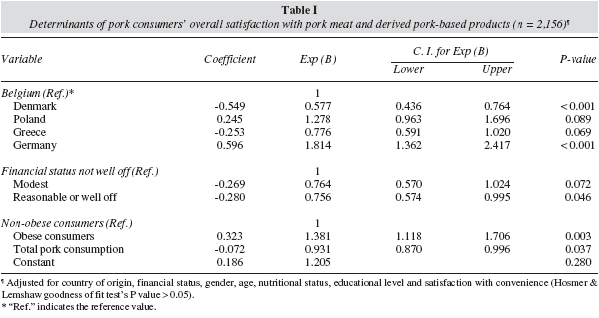Mi SciELO
Servicios Personalizados
Revista
Articulo
Indicadores
-
 Citado por SciELO
Citado por SciELO -
 Accesos
Accesos
Links relacionados
-
 Citado por Google
Citado por Google -
 Similares en
SciELO
Similares en
SciELO -
 Similares en Google
Similares en Google
Compartir
Nutrición Hospitalaria
versión On-line ISSN 1699-5198versión impresa ISSN 0212-1611
Nutr. Hosp. vol.25 no.1 Madrid ene./feb. 2010
Obesity and overall satisfaction with pork meat and derived pork-based products
Obesidad y satisfacción general con carne de cerdo y productos cárnicos
Each consumer is a potential patient. Epidemiologists and public health practitioners question why there is little adherence to dietary advice, particularly among overweight/obese individuals. Most recommendations describe a lifestyle incorporating healthy diet, physical activity, and weight management. Dietary advice considers reduction of energy intake, particularly added lipids or sugar and reduction of salt. It conveys increased consumption of fruits and vegetables, a variety of foods, and limited consumption of meats, especially processed ones.1 Red meat, including pork, has been suggested to increase risk of colon cancer or cardiovascular disease.2 However, recent studies have associated red meat and derived products' with healthy outcomes such as the reduction of cholesterol levels and blood pressure.3,4
Weight management is challenging, particularly for obese patients. Added to the physical challenge, they face emotional and affective distress while in diet. Then, eating becomes a coping mechanism that may hinder any desirable progress.
Within a larger web-based pan-European consumer research project, carried out in January 2008 in Belgium, Denmark, Poland, Greece and Germany,5 we investigated investigated possible associations between obesity and overall satisfaction with pork meat and derived pork-based products. Consumers' satisfaction is an emotional or cognitive response based on personal experience with a particular subject, pork meat in this case.6 Since obesity determinants are diverse, we hypothesized that specific consumer characteristics such as overall satisfaction with pork and derived products may entail both an opportunity and a threat to weight management programs, if any association with obesity could be demonstrated.
From a total of 2437 consumers, 2156 respondents self-classified themselves as pork eaters, and selfreported their weights and heights. A binary logistic regression model was fitted to investigate possible associations between overall satisfaction, socio-demographics and nutritional status (table I).
Compared to Belgian consumers, Germans were more likely to be satisfied with pork, while Danish were not. Wealthy respondents were less likely to be satisfied with pork than those who were not well-off, probably reflecting a socio-economic gradient in the use and evaluation of pork. Most importantly, obese Europeans in this sample were 1.4 times more likely to be satisfied with pork products than non-obese consumers.
Since satisfaction is a precondition of repeated purchase and loyalty, our study suggests that any dietary intervention implying reduction of products with which consumers are satisfied will be a threat to its success. Contrarily, diet formulations could benefit from incorporating food items with which consumers are satisfied such as pork meat and derived pork-based products. Selection of the healthiest alternatives could enhance adherence to dietary interventions, and forecast their success. The challenge is to realize satisfaction with healthy products, and satisfaction with prescribed diets (weight management programs or at hospital).
Acknowledgments
The authors gratefully acknowledge financial support from the EU through the Integrated Project QPORKCHAINS FOOD-CT-2007-036245 under the Sixth Framework Programme for Research, Technological Development and Demonstration Activities.
H. Resano1,2, W. Verbeke1, M. Dutra de Barcellos3,4, K. G. Grunert3 and F. J. A. Pérez-Cueto1*
1Ghent University. Department of Agricultural Economics. Ghent. Belgium.
2Agro-food Science and Technology Park Aula Dei. Zaragoza. Spain.
3Aarhus University. MAPP Centre for Research on Customer Relations in the Food Sector. Aarhus. Denmark.
4Pontifical Catholic University of Rio Grande do Sul. Porto Alegre. Brazil.
References
1. World Cancer Research Fund/American Institute for Cancer Research (2007). Food, Nutrition, Physical Activity and the Prevention of Cancer: A Global Perspective (517 pp). Washington DC. [ Links ]
2. Ferguson, L. Meat and Cancer, Meat Sci doi:10.1016/j.meatsci.2009.06.032 [ Links ]
3. McAfee A, Sorley E M, Cuskelly GJ, Moss BW, Wallace J M W, Bonham M P, Fearon A M. Red meat consumption: An overview of the risks and benefits. Meat Sci 2010; 84: 1-13. [ Links ]
4. Rubio JA, Rubio MA, Cabrerizo L, Burdaspal P, Carretero R, Gomez-Gerique JA, Montoya MT, Maestro ML, Sanz MT, Fernandez C. Effects of pork vs veal consumption on serum lipids in healthy subjects. Nutr Hosp 2006; 21: 75-83. [ Links ]
5. Verbeke W, Pérez-Cueto F, De Barcellos MD, Krystallis A, Grunert K. European citizen and consumer attitudes and preferences regarding beef and pork. Meat Sci 2010; 84 (2): 284-292 doi:10.1016/j.meatsci.2009.05.001 [ Links ]
6. Giese JL, Cote JA. Defining consumer satisfaction. Acad Mark Sci Rev 2000; 4(2). [ Links ]
![]() Correspondence:
Correspondence:
Federico Pérez-Cueto.
Ghent University.
Coupure Links 653.
9000 Ghent (Belgium)
E-mail: federico.perezcueto@ugent.be
Recibido: 29-X-2009.
Aceptado: 29-X-2009.















